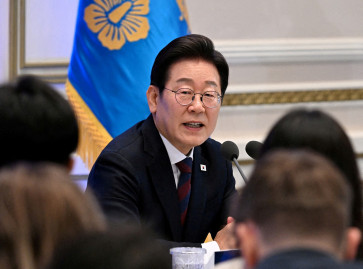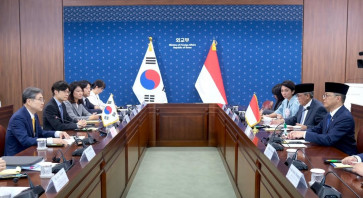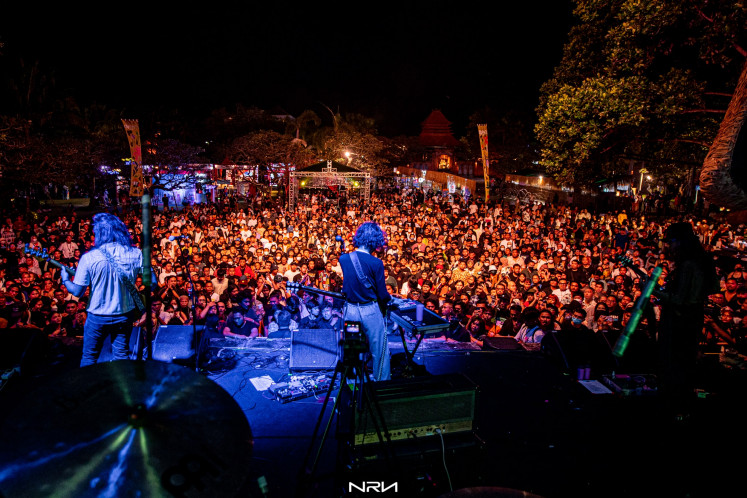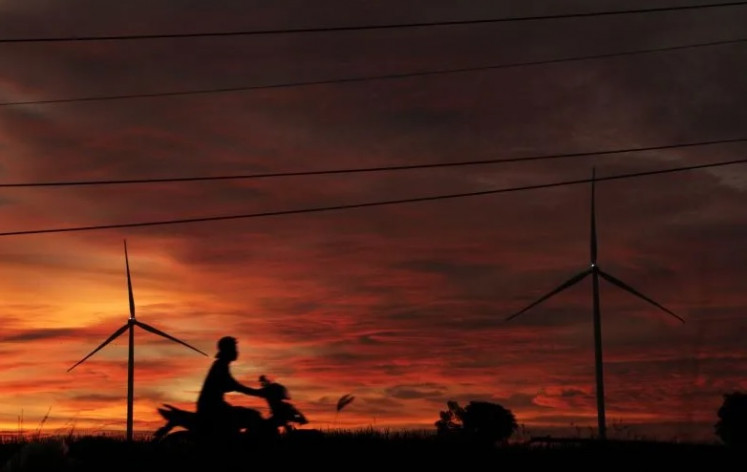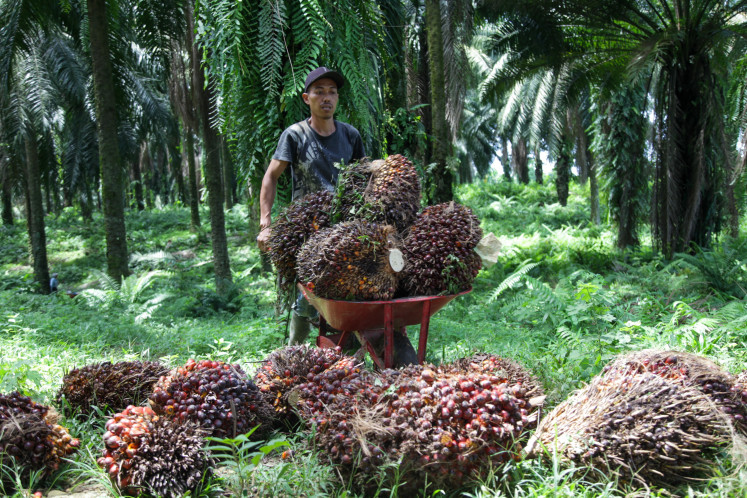Popular Reads
Top Results
Can't find what you're looking for?
View all search resultsPopular Reads
Top Results
Can't find what you're looking for?
View all search resultsPlastic bottle-paid bus service: By the people, for the people
Plastic fantastic: Bus conductor Badrul carries three large plastic bottles handed in by a passenger as a ticket fare for a ride on the Suroboyo bus in the East Java capital city
Change text size
Gift Premium Articles
to Anyone
P
Each bus in the fleet of eight is equipped with 12 CCTV cameras inside and three on the outside for the comfort and safety of passengers. Passengers, who are keen to know the whereabouts of these buses prior to taking the ride can access the information through the GoBis app available on Google Play. On top of all those attractive features, the buses are cool enough for anyone to jump on and escape the heat of the city.
At a glance, it feels like riding a city bus in some European country or in neighboring Singapore. But no, this bus service — the Suroboyo Bus — is not alien to us, as you can get the experience right here in Indonesia, in Surabaya to be precise.
What makes the bus service more awesome is that you do not have to bring cash to pay for the fares. You just need to bring along empty used plastic bottles with you every time you want to take a ride: Either three 1.5-liter bottles, five medium-sized bottles, or 10 plastic cups.
For any of you who do not want to be burdened with bringing used plastic bottles or cups every time you ride on the bus, you can bring them to the allocated waste banks, to drop boxes at a number of bus stops or to the drop box at the Purabaya bus terminal at any time. There, you will be given a transit card — a ticket that allows a passenger of the service to take either a certain number of prepurchased trips or unlimited trips within a fixed period of time. Then you just need to bring the card, which the bus conductor will punch a hole into every time you ride the bus.
The plastic-bottle-paid bus service is the first such system introduced in the country, although it has been implemented in a number of European countries and China.
“I once passed an area of the city where development had been carefully planned, yet it was flooded by some 15 centimeters of water. I got out of my car and took a look at the waterways, only to find out that it was completely blocked by plastic bottles,” Surabaya Mayor Tri Rismaharini told The Jakarta Post in a recent interview about her reason for combating piles of plastic waste in the city.
The finding by Risma, as the mayor is popularly called, is in line with Surabaya City data, which shows that 15 percent, or nearly 400 tons, of Surabaya's daily waste is plastic.
The mayor took a photo of the scene and sent it to the local media with the aim of generating awareness among Surabaya residents on the danger of irresponsibly disposing of plastic waste anywhere in the city.
“Then [the idea came up] to monetize the abandoned plastic waste but at the same time help prevent flooding and preserve the city’s environment. Another question was how to reduce traffic jams in the city,” she said. “Our decision was then to use the plastic waste as the bus fare.”
The Suroboyo Bus was inaugurated in April 2018 and has been serving only the city’s main thoroughfares, so as not to kill other types of public transportation, which have since then been requested to operate on routes other than the main thoroughfares.
The new bus service has in fact lessened plastic waste in Surabaya and simultaneously provided an alternative mode of transportation for city residents, which in turn helps reduce traffic in the provincial capital. However, the new system has led to another problem in the form of used plastic bottles and cups piling up in the city’s storage facilities. As city statistics show, one Suroboyo Bus can collect up to 250 kilograms of plastic bottles a day, or roughly 7.5 tons in a month.
Risma apparently has the answer to the problem, while citing the long bureaucracy and the regulation that prevents her from taking the initiatives to immediately sell them for money as income for the city and at the same time settle the problem of high piles of plastic waste in the storage facility.
“I cannot directly sell those plastic bottles, as I have to follow the government regulations, such as through a tender system. Otherwise, I will have to deal with potential legal consequences for failure to comply with the system,” she said.
In fact, the city’s storage facility also keeps other used goods, such as motorcycles, cars and household items and appliances. All of them, if sold at an auction, could contribute between Rp 10 billion (US$702,146) and Rp 15 billion to Surabaya city coffers annually.
“I have to apply for an auction of those plastic bottles — and the other goods — through the State Auction Hall. And there is already a long queue for the auction of goods there, so we have to wait our turn,” the mayor explained.
Risma called on the general public, particularly Surabayans, to remain patient in the implementation of the Suroboyo Bus service and in dealing with the subsequent impacts.
“The system is far from perfect. The most important thing is Surabaya residents’ awareness to help preserve the city’s environment, which has shown a lot of improvement. For me, the residents’ environmental awareness is such a valuable achievement that cannot be compensated for even with an infinite amount of money,” she said in closing the interview with the Post.


